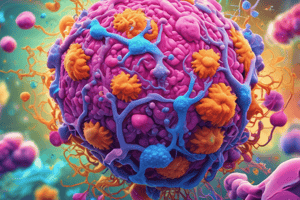Podcast
Questions and Answers
What is the characteristic shape of the double-stranded DNA in herpesviruses?
What is the characteristic shape of the double-stranded DNA in herpesviruses?
- Linear
- Spiral
- Toroid (correct)
- Circular
How many capsomeres are present in the protein coat of herpesviruses?
How many capsomeres are present in the protein coat of herpesviruses?
- 200
- 100
- 162 (correct)
- 150
What is the origin of the envelope surrounding the nucleocapsid of herpesviruses?
What is the origin of the envelope surrounding the nucleocapsid of herpesviruses?
- Nuclear membrane of the infected cell (correct)
- Golgi apparatus of the infected cell
- Plasma membrane of the infected cell
- Endoplasmic reticulum of the infected cell
What is the length of the viral glycoprotein spikes on the envelope of herpesviruses?
What is the length of the viral glycoprotein spikes on the envelope of herpesviruses?
Which of the following herpesviruses is commonly associated with Kaposi sarcoma?
Which of the following herpesviruses is commonly associated with Kaposi sarcoma?
How many viruses are there in the herpes group that infect different animal species?
How many viruses are there in the herpes group that infect different animal species?
Where does cytomegalovirus replicate in the human body?
Where does cytomegalovirus replicate in the human body?
What is a common outcome of intrauterine or early postnatal infection with CMV in newborns?
What is a common outcome of intrauterine or early postnatal infection with CMV in newborns?
What is the incubation period of CMV?
What is the incubation period of CMV?
Why are CMV infections more severe in immunosuppressed hosts?
Why are CMV infections more severe in immunosuppressed hosts?
What is a frequent complication of primary CMV infections in immunosuppressed hosts?
What is a frequent complication of primary CMV infections in immunosuppressed hosts?
What is a characteristic of CMV?
What is a characteristic of CMV?
What is the method used to identify the agent responsible for herpesvirus infection?
What is the method used to identify the agent responsible for herpesvirus infection?
What is the characteristic feature of herpesvirus infection observed in scrapings obtained from the base of a vesicle?
What is the characteristic feature of herpesvirus infection observed in scrapings obtained from the base of a vesicle?
When do antibodies appear after HSV infection?
When do antibodies appear after HSV infection?
What is the most common complication of varicella-zoster virus infection in healthy children?
What is the most common complication of varicella-zoster virus infection in healthy children?
What is the typical incubation period of varicella-zoster virus infection?
What is the typical incubation period of varicella-zoster virus infection?
Which of the following antiviral drugs is effective against HSV infections?
Which of the following antiviral drugs is effective against HSV infections?
What was the first year in which Human Herpesvirus 8 (HHV-8) was detected?
What was the first year in which Human Herpesvirus 8 (HHV-8) was detected?
Which of the following is NOT a characteristic of Poxviruses?
Which of the following is NOT a characteristic of Poxviruses?
What is the name of the disease caused by the variola virus?
What is the name of the disease caused by the variola virus?
Which of the following is a type of virus that is closely related to HHV-8?
Which of the following is a type of virus that is closely related to HHV-8?
What is the typical length of the incubation period of variola (smallpox)?
What is the typical length of the incubation period of variola (smallpox)?
Who introduced vaccination with live cowpox virus in 1798?
Who introduced vaccination with live cowpox virus in 1798?
What is the genotype of the viral DNA of papillomaviruses?
What is the genotype of the viral DNA of papillomaviruses?
What is the primary route of transmission of papillomaviruses?
What is the primary route of transmission of papillomaviruses?
What is the typical outcome of papillomavirus infections at cutaneous and mucosal sites?
What is the typical outcome of papillomavirus infections at cutaneous and mucosal sites?
Which of the following HPV types are considered high cancer risk?
Which of the following HPV types are considered high cancer risk?
What is the primary organ affected by viral hepatitis?
What is the primary organ affected by viral hepatitis?
What is the typical mode of transmission of human papillomavirus (HPV) genital infections?
What is the typical mode of transmission of human papillomavirus (HPV) genital infections?
What is the genetic material of hepatitis B virus?
What is the genetic material of hepatitis B virus?
Which of the following hepatitis viruses is an enveloped virus?
Which of the following hepatitis viruses is an enveloped virus?
What is the classification of hepatitis B virus?
What is the classification of hepatitis B virus?
What is the target of parvovirus B19?
What is the target of parvovirus B19?
What is the consequence of hepatitis B virus infection in infants?
What is the consequence of hepatitis B virus infection in infants?
What are the two major polypeptides associated with hepatitis B virus?
What are the two major polypeptides associated with hepatitis B virus?
Which of the following is NOT a characteristic of hepatitis viruses?
Which of the following is NOT a characteristic of hepatitis viruses?
What is the mode of transmission of hepatitis E virus?
What is the mode of transmission of hepatitis E virus?
Which of the following is a complication of hepatitis B virus infection?
Which of the following is a complication of hepatitis B virus infection?
What is the characteristic of hepatitis A virus?
What is the characteristic of hepatitis A virus?
Study Notes
Herpesviruses
- Cytomegalovirus (CMV) (HSV-5) is a ubiquitous herpesvirus that can cause infectious mononucleosis (heterophil-negative) and congenital defects
- CMV replicates in epithelial cells of the respiratory tract, salivary glands, and kidneys, and persists in lymphocytes
- Incubation period: 4-8 weeks
- Properties of the virus: largest genetic content of human herpesviruses (HHV)
Transmission and Pathogenesis
- CMV can be transmitted from person to person through close contact with virus-bearing material
- Primary CMV infections in immunosuppressed hosts are more severe than in normal hosts, with pneumonia as a frequent complication
- Cytopathology: multinucleated giant cells indicate herpesvirus (HSV-1, HSV-2, or varicella-zoster) presence
- Serology: antibodies appear 4-7 days after infection, peaking in 2-4 weeks, detected by neutralization, immunofluorescence, and enzyme-linked immunosorbent assay
Treatment and Diagnosis
- Several antiviral drugs are effective against HSV infections, including Acyclovir, Valacyclovir, and Vidarabine
- Laboratory diagnosis: polymerase chain reaction (PCR), isolation and identification of virus, cytopathology, and serology
Herpes Simplex Virus (HSV)
- HSV-1 and HSV-2 are widespread in the human population, with HSV-1 spread by contact and HSV-2 transmitted sexually or from a maternal genital infection to a newborn
- HSV growth cycle: rapid, requiring 8-16 hours for completion
- Clinical findings: primary infections may be clinically inapparent, but result in antibody production and establishment of latent infections in sensory ganglia
- Recurrent lesions are common
Varicella-Zoster Virus (HSV-3)
- Varicella-zoster virus (VZV) causes varicella (chickenpox), a mild, highly contagious disease characterized by a generalized malaise, fever, and vesicular eruption of the skin and mucous membranes
- Incubation period: 10-21 days
- Cases of congenital varicella syndrome can occur after maternal cases of chickenpox during pregnancy
- Varicella pneumonia is rare in healthy children but is the most common complication in neonates, adults, and immunocompromised patients
Human Herpesvirus 8 (HHV-8)
- HHV-8 is also known as Kaposi sarcoma-associated herpesvirus (KSHV)
- It was first detected in 1994 in Kaposi sarcoma specimens
- HHV-8 is lymphotropic and causes Kaposi sarcomas, vascular tumors occurring in AIDS patients, and multicentric Castleman disease
Poxviruses
- Poxviruses are the largest and most complex of viruses infecting humans, resistant to inactivation
- They have linear ds DNA and own RNA polymerase
- Infections are characterized by a rash, with lesions induced by some members of the family being markedly proliferative
- The group includes vaccinia virus, variola virus, and parapoxvirus
- Edward Jenner introduced vaccination with live cowpox virus in 1798
Hepatitis Viruses
- Hepatitis viruses are caused by one of the following five agents: hepatitis A virus (HAV), hepatitis B virus (HBV), hepatitis C virus (HCV), hepatitis D (HDV), and hepatitis E virus (HEV)
- All Hepatitis viruses are ss RNA, except HBV which is ds DNA
- HAV and HEV are nonenveloped viruses, while HBV, HCV, and HDV are enveloped viruses
- Hepatitis viruses produce acute inflammation of the liver, resulting in a clinical illness characterized by fever, gastrointestinal symptoms, and jaundice
Parvoviruses
- Parvovirus B19 is pathogenic for humans and has a tropism for erythroid (RBC) progenitor cells
Studying That Suits You
Use AI to generate personalized quizzes and flashcards to suit your learning preferences.
Related Documents
Description
Test your knowledge on the cultivation and isolation of viruses, including DNA viruses such as herpesviruses, poxviruses, and papillomaviruses. This quiz covers various types of viruses that commonly infect humans.




